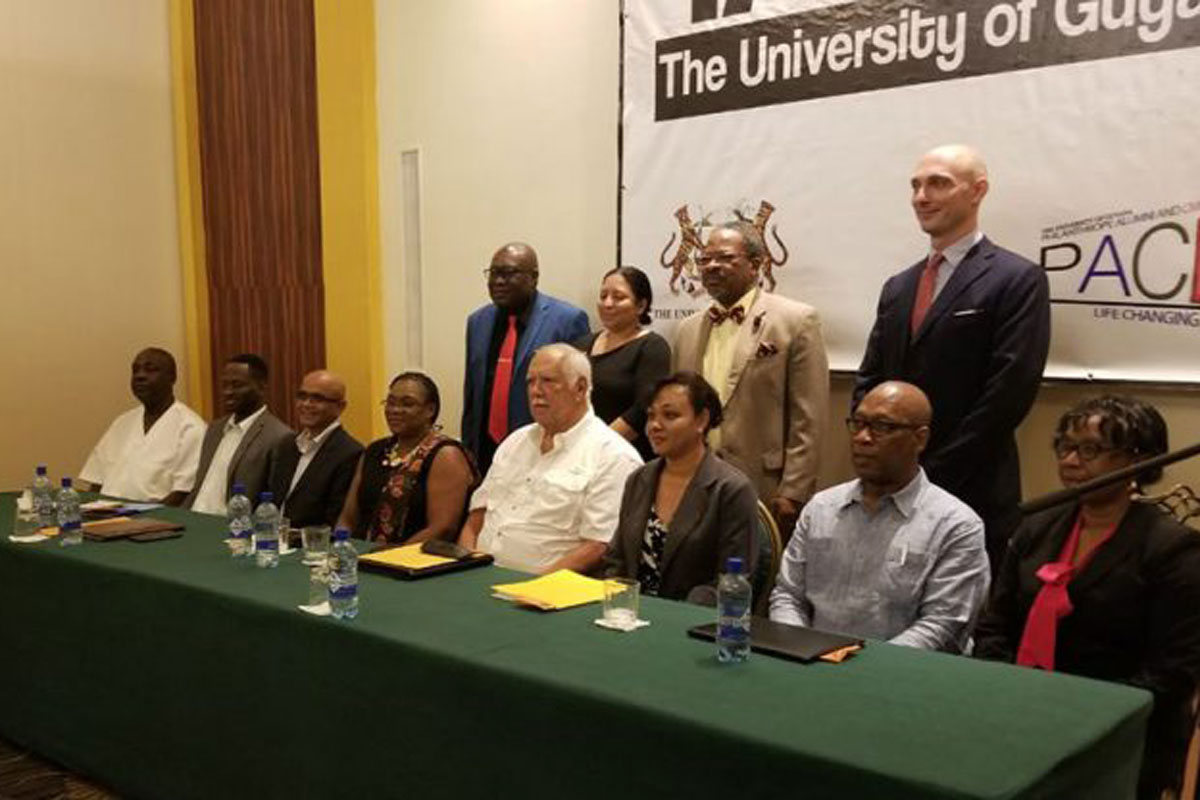
Union input vital for education sector reform
Monday, February 5, 2018 - 23:56The active involvement of unions, particularly the teachers union, is critical for true and serious reform of the education sector, according to Coretta McDonald, General Secretary of the Guyana Teachers’ Union (GTU).
McDonald made the case on Wednesday, during her address at the University of Guyana’s 11th Turkeyen and Tain Talks, which explored the role of education reform for the nation’s development.
The forum, which was held at the Pegasus Hotel under the theme “Education as Freedom: Education Reform and Socio-Economic Development in Guyana,” featured presentations from speakers Professor Michael Scott, Deputy Vice Chancellor of Academic Engagement at UG; Ed Caesar, Chair of the Education Reform Commission; Petal Jetoo, National Science Coordinator; Christopher Fernandes, Chair of the St Stanislaus College school board; McDonald; David Singh, Vice President of Conservation Inter-national; and Joel Simpson, of the Guyana Equality Forum.
Chief Education Officer Marcel Hutson appeared on behalf of Minister of Education Nicolette Henry.
The presentations made cases for reforms in the management of education, education for sustainable development and reform in regards to the delivery of science and sex education within the education system.
“…It is easy to conclude that education is critical to the sustainable development of our people and this country. It is even more critical when unions…are allowed to be a part of educational reforms at all levels. We cannot talk education reform when we want to sideline the union. We cannot talk education reform when we only have the union at forums just to say that they are present,” McDonald stated.
McDonald’s impassioned speech was packed with examples of how the treatment of teachers and the union that represents them continues to stifle development within the education sector. She spoke of the unavailability of resources in the classroom, the workload often dumped on teachers who are forced to perform tasks in addition to their own, including secretarial duties, and the disrespect often meted out to members of a profession once considered noble.
McDonald argued for the continuous professional and academic development of teachers, programmes that have “merit”—financial or otherwise, as well as adequate remuneration for teachers. She called for more engagement and the “marrying” of local institutions with tertiary institutions overseas to adopt best practices, revamping of the teachers training programme at the Cyril Potter College of Education, and an update of the policies within the sector, including the code of conduct governing teachers.
“We cannot talk educational reform when there is no serious desire to deal with the professional or the academic aspect of upliftment of the practitioners. We cannot talk educational reform when we keep doing what we’ve been doing since 1923 and we want to do it in 2018. We have to keep moving and adjusting to the time as we go…,” she said.
“…If you’re seriously talking education reform, we have to go and relook at a number of the policies we have—many of them are outdated and they need to be divorced and separated…we have to go to the table, put our heads and minds and hearts there, of course with the union involved actively that is, to sit and look at some of those policies that we have with a vision of reviewing and making them relevant… If we’re seriously talking education reform, then the need for all the talking and the writing and everything else must stop now and we should start walking and have the actions happen,” McDonald stated.
Tax-free remuneration for teachers
Fernandes’ presentation, like McDonald’s, focused on the areas within the sector that need improvement, particularly in relation to the teaching profession.
Fernandes, a businessman, and Chairman of the St Stanislaus College board, posited that in order to create a well-trained workforce, the teaching profession needs to be made more attractive. His suggestions for achieving this goal included having the remuneration of trained teachers be free of income tax; providing duty-free perks to teachers at the end of a predetermined period of satisfactory service; and possibly having teachers be eligible for a house lot with concessionary low interest financing to construct a two bedroom house. He suggested that this can be limited to $5 million.
He also recommended revisiting the retirement age.
“We cannot longer afford to lose our good experienced teachers who are currently mandated to retire at age 55 since we are unable to replace them with persons of similar competence and experience,” he said
“Our intention therefore to improve the quality of education would be to encourage better quality individuals to the teaching profession by making the profession more attractive. Expose them to active career guidance, allowing for the teacher to regain the respect of the population and students which they once commanded,” Fernandes added.
He also recommended a revision of the management of the ministry, suggesting that there be a “total audit of the management system of the ministry in which the Minister should just be the executive Chairman” and where the “day to day administration needs to be handled by a highly qualified and well trained professional”. He said that this “professional,” the CEO, would be supported by at least two “equally well qualified deputies.”
Article adapted from: https://www.stabroeknews.com/2018/news/stories/02/02/union-input-vital-for-education-sector-reform/
